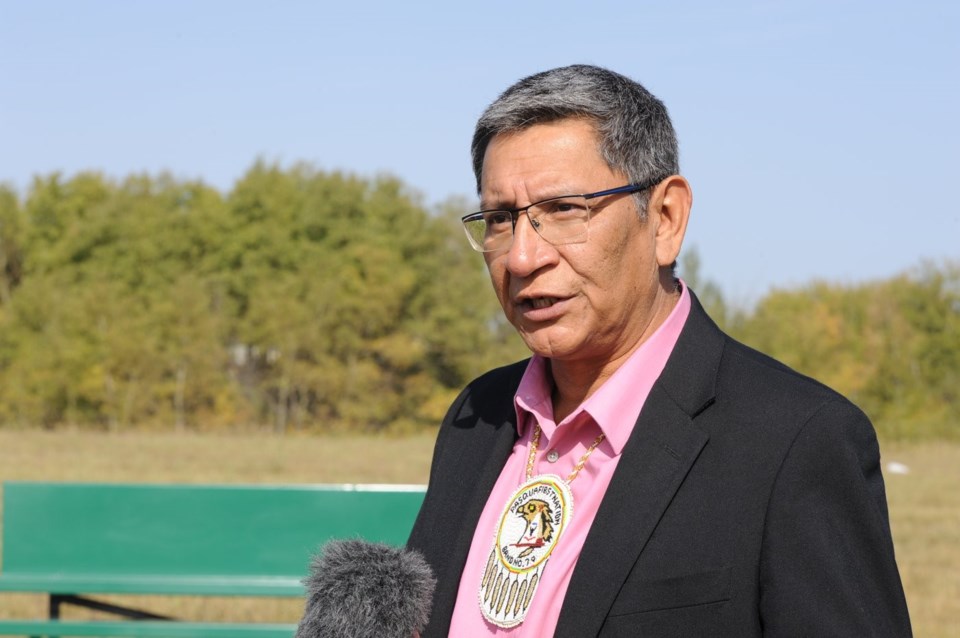As the coronavirus continues its daily surge in Saskatchewan, First Nations in the province are learning of its far-reaching, indiscriminate effects.
Three communities in the Treaty 4 area near Regina have recently recorded viral infections: The Piapot First Nation, north of Regina, declared an outbreak on Friday, while the adjacent Muscowpetung Salteaux Nation recorded its first case the same day; Pasqua First Nation is dealing with three active cases on-reserve and one case off-reserve.
Piapot Chief Mark Fox posted a video to social media Friday telling his community of the outbreak.
Fox, who was unavailable for an interview, didn’t say how many people at Piapot have been infected with COVID-19, but he referenced “public mass gatherings” from Nov. 4 to Nov. 6, advising anyone who attended them to monitor themselves for viral symptoms.
The community’s school, daycare and band office all remain closed “until further notice,” he said.
Fox advised members to “eliminate non-essential travel. Go buy groceries by yourself if you can and do not take your whole family. If you must leave, make sure you wear a mask. Use hand sanitizer.”
Home-to-home visits in the community are no longer allowed, he added.
In Saskatchewan overall, there are 1,106 recorded coronavirus infections in First Nations, as of Monday. From late June until early October weekly new infections were in the single-digits or at zero, based on Indigenous Services Canada (ISC) data.
From Nov. 1 to Nov. 21, weekly new infections jumped to at least 139; last week there were 39 new infections.
Among those was the first recorded case at Muscowpetung, which sits east of Piapot and north of Edenwold, along the Qu’Appelle River.
Muscowpetung’s emergency services co-ordinator, Jim Pratt, told the Leader-Post the band’s leadership didn’t institute a full-scale lockdown, choosing “preventative check-points” in and out of the community.
They started those on Oct. 17, following Saskatchewan Health Authority guidelines.
“We put in our tracers ... if you (come) into our reserve you (have) to give your name and three places that you visit and then you (can) carry on. When we leave the reserve, (you) also have to leave your name and find out what three places you’re going to,” he said.
There’s also a community-wide curfew from 11 p.m. to 7 a.m., he said. “We didn't want to panic people by saying ‘lockdown.’”
Chief Melissa Tavita said they’re ready for that, if need be: Muscowpetung’s food store is still well-stocked; another option is butchering recently acquired buffalo for food.
It’s a good thing the community hasn’t been forced to do that, she said, referencing the public health aspect and the spiritual importance the bison serve.
“I've head people saying they've spoke to elders and that these buffalo are protectors and this is the reason why our community isn't hit,” she said.
Pratt advised Muscowpetung members to watch for announcements from band leadership about on-reserve testing.
Pasqua Chief Matthew (Todd) Peigan said the First Nation’s pandemic response team is giving supplies to the three on-reserve COVID-positive members and their families.
“Thermometer, antibiotics, vitamins and also essentials they need, like bread, milk and juice,” because they’re isolating for two weeks and can’t leave home.
Similar to Muscowpetung, Pasqua is still using its 24-hour security check-points for entering and exiting the First Nation.
He encouraged everyone to wear masks, physically distance, “avoid gatherings, sanitize and wash their hands often.
“Always consider whoever you meet has COVID-19, and stay way,” he said.
As of Tuesday afternoon, the virus has killed 51 people in Saskatchewan; 3,819 infections are active.
Indigenous Services Canada did not respond by press time to the Leader-Post's request for comment.



